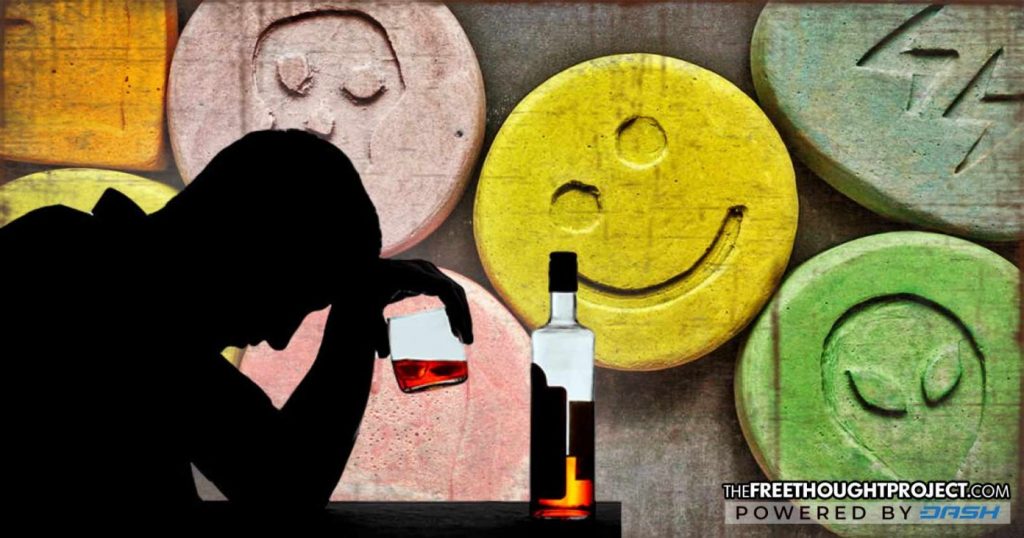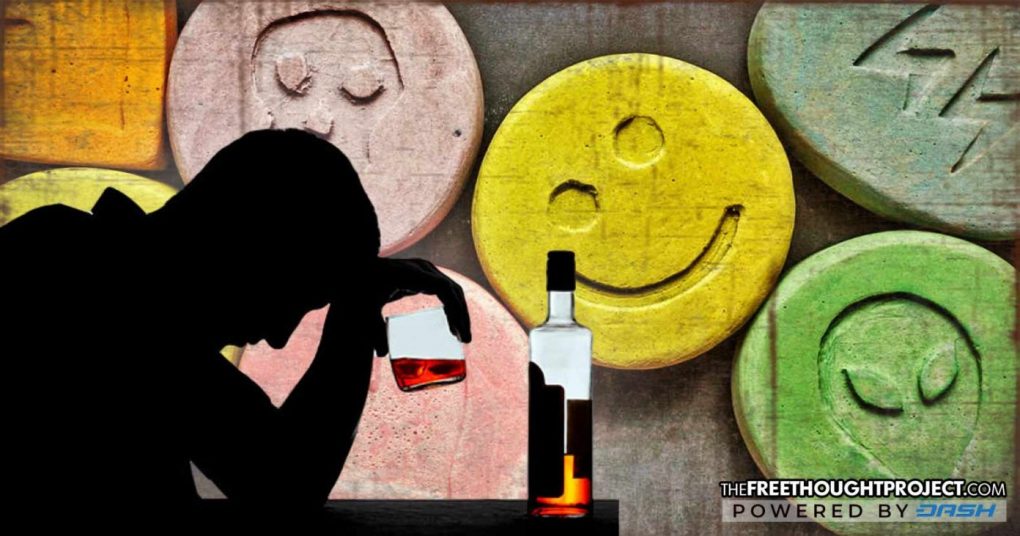Revolutionary Clinical Trials Show Party Drug MDMA May Work to Cure Alcoholism
 By John Vibes
By John Vibes
A new trial in the UK, led by a team of researchers at the Imperial College of London, is seeking to determine whether MDMA can help alcoholics overcome their addiction. MDMA is the active ingredient in the club drug known as ecstasy or molly, which has been illegal in the U.S. and many other Western countries since the mid-1980s.
Until recently, any kind of scientific research into the benefits of psychedelics has been strictly forbidden by the U.S. government. However, the studies that are beginning to take place are showing that these compounds have incredible healing abilities.
The alcoholism study will take twenty heavy drinkers, who drink the equivalent of five bottles of wine per day. All of the test subjects are people who have had no success with traditional treatments and have a history of repeated relapse.
Widget not in any sidebars
As a part of the study, the participants will go through detox before completing an 8-week course of MDMA-assisted therapy, where they will be given a dose of MDMA in just two of the sessions. During the therapy sessions, the participants will work through their addiction issues as well as past trauma or life stress that may play a role in their decisions. After the sessions are over, researchers will follow up with the patients for several months after to assess the potential long-term effects of the trial.
Ben Sessa, a clinical psychiatrist and senior research fellow at Imperial College London who is working on the study, recently spoke at the Breaking Convention conference in London about his research.
“We know that MDMA works really well in helping people who have suffered trauma and it helps to build empathy. Many of my patients who are alcoholics have suffered some sort of trauma in their past and this plays a role in their addiction. After 100 years of modern psychiatry, our treatments are really poor. The chances of relapse for these patients are really high—90 percent at three years. No one has ever given MDMA to treat alcoholism before,” Sessa explained.
Sessa also highlighted the fact that this study was not just about expecting the drug to work on its own, but using it as a tool in therapy to help the patient achieve some type of realization about how to improve their lives.
“It’s using drugs to enhance the relationship between the therapist and the patient, and it allows us to dig down and get to the heart of the problems that drive long-term mental illness,” he said.
According to the United States’ National Institute on Alcohol Abuse and Alcoholism, approximately 90 percent of alcoholics will have at least one relapse in the years following treatment, and Sessa thinks we could be doing much better.
“There’s no other part of medicine that would tolerate that. Imagine that kind of outcomes in surgery or immunology or even oncology. Doctors wouldn’t tolerate that. After a 100 years of modern psychiatry, it’s outrageous! If we can do any better than 90 percent relapse rates then we’re onto something,” Sessa told Talking Drugs.
Instead of just giving addicts lectures or confrontational interventions, Sessa says that MDMA allows us to uncover the buried trauma that pushes some people towards a life of addiction.
“There’s a real barrier in severe trauma, you can talk about all sorts of things but you won’t talk about that one thing. And the reason being that as soon as you go anywhere near that memory, the fear is so great you daren’t open that door. That’s where all treatments get stuck: people are too scared to talk about their pain,” Sessa said.
Traditional psychotherapies would be, you know ‘tell me about your rape…’ and at that point [the patients] just flee and they’re out the door. So on MDMA you say ‘tell me about your rape’—people who’ve had 30 years of repressing it—and they say ‘do you know what… I can’, and [they] talk all about it. They can do the trauma-focused psychotherapy that they’ve been unable to do with all the traditional treatments,” he added.
In other studies, MDMA has already been found to have positive impacts on treatments with PTSD, as well as relationship counseling.
This is actually not the first time that psychedelic drugs have been suggested as a possible treatment for alcoholism. In fact, Bill Wilson, the co-founder of the Alcoholics Anonymous program, actually considered promoting LSD as a tool for alcoholics to shake their addiction. Wilson was a close associate with many early adopters of LSD and took numerous trips in controlled, scientific settings while he was involved with the AA program.
Wilson believed that LSD was not a cure-all for mental problems and diseases such as addiction, but he felt that it could be a catalyst towards understanding one’s own life and changing direction.
“I don’t believe [LSD] has any miraculous property of transforming spiritually and emotionally sick people into healthy ones overnight. It can set up a shining goal on the positive side, after all, it is only a temporary ego-reducer. The vision and insights given by LSD could create a large incentive—at least in a considerable number of people,” Wilson reportedly said after his first LSD trip in 1956.
In a later letter to Gerald Heard, one of his associates in the LSD scene, Wilson wrote, “I am certain that the LSD experiment has helped me very much. I find myself with a heightened color perception and an appreciation of beauty almost destroyed by my years of depression.”
Psychedelics offer us a glimpse into the final frontier of humanity—the consciousness. With these substances, we can explore the human imagination with profound insight that will help us in our own personal lives and the bigger picture as well. We must push for new legitimate scientific research into the therapeutic uses for these drugs. These studies will prove, as they have in the past, that psychedelic compounds have many medical and spiritual uses that are necessary for our species to continue the evolution of our consciousness.
John Vibes is an author and researcher who organizes a number of large events including the Free Your Mind Conference. He also has a publishing company where he offers a censorship free platform for both fiction and non-fiction writers. You can contact him and stay connected to his work at his Facebook page. John just won a 3-year-long battle with cancer, and will be working to help others through his experience, if you wish to contribute to his treatments consider subscribing to his podcast to support. This article first appeared at The Free Thought Project.



